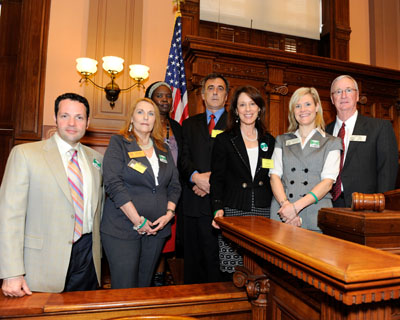
Editor’s Note: The Georgia Coalition to Prevent Genocide recently scored a victory with its advocacy when the Georgia state legislature approved a resolution making April Genocide Prevention and Awareness Month. Guest blogger and activist Melanie Nelkin shares details of the event and describes what she and fellow activists have planned for the first annual month of awareness.
This year, for the first time, the state of Georgia will commemorate Genocide Prevention and Awareness Month. Last week at the Georgia Dome in Atlanta, the Georgia General Assembly, with the support of anti-genocide and human rights organizations, passed a resolution recognizing April as a time to remember those who have died and raise awareness about ongoing atrocities targeting people because of race, religion, ethnicity, or nationality, with the aim of preventing genocide in the future.
Catalyzing this piece of legislation was the Georgia Coalition to Prevent Genocide, known as GC2PG, an advocacy organization with dozens of national and local organizational members and individuals. GC2PG worked in close partnership with House Representative Elena Parent, who recruited five co-sponsors, and Senator Judson Hill, who sponsored the Senate resolution.
GC2PG and other human rights champions in Georgia were invited to the Assembly to present the resolution and thank the legislature for its support.

Ayak Raeth, an Atlantan since the 1980s, escaped the civil war in South Sudan to build a new life here. She currently works as a lab tech at Grady Memorial Hospital. In her remarks to the House chamber she underscored the importance of U.S. support to Darfur, Sudan and to the newest country of South Sudan, where violence and marginalization by the government of Sudanese President Omar al-Bashir, who is wanted for war crimes and genocide, eventually led to the South’s independence.
Semir Dulic, spoke on behalf of the Bosniak community in Lawrenceville, Georgia. A survivor of the Bosnian genocide committed by the Bosnian Serbs in 1993, he now dedicates his life to genocide prevention as a representative in the Bosnian Muslim Community.
The goal of Genocide Prevention and Awareness Month is to educate the public about the history of previous and contemporary genocides, and focus attention on the specter of genocide to emphasize the importance of developing policies, strategies, and programs geared towards preventing genocide.
Commemorating the victims of genocide is not new to the Atlanta community. This coming April 22 marks the 48th community-wide Holocaust Remembrance Day of Yom Hashoah. We emphasize community solidarity in our diverse city to underscore that there are no demographic trends in the phenomenon of genocide, mass atrocities, and eliminationism. Throughout history, we’ve seen that there is no consistent population targeted, nor are there consistent perpetrators. The Armenians, Jews, Tutsi, Bosniaks, Christians from South Sudan, and Darfuris can testify to that.
Raphael Lemkin was a Holocaust survivor who grew up in eastern Poland and fled to the United States in 1939. After the war, Lemkin learned that more than 40 members of his family, including his parents, had been killed in the Holocaust. As a lawyer, he dedicated his life to creating legal protections for ethnic, national, religious and cultural groups. Winston Churchill, in a 1941 address, noted, “We are in the presence of a crime without a name.” Lemkin gave it a name: genocide.
When the United Nations was created, Lemkin expected the body would pass a law taking a stand against genocide. He struggled with the fact that a government could essentially do with its citizens whatever it wanted, all in the name of sovereignty. And so he became a one man-lobbying machine pushing for an international law to prevent and punish this most egregious of crimes. He thought that once the word was accepted the world would be ready to confront the crime. If he were here with us today, I think he would be crushed to look back at the atrocities committed over the last seven decades. But I think Lemkin would also be encouraged with the progress of the anti-genocide movement—the “upstanders” who represent youth, students, faith based organizations, survivors, and other community organizations who are agitating on behalf of the victims of present day mass atrocities and genocide. I think he would have hope.
There are no demographic trends in the phenomenon called “the bystander,” but we know that historically it is by far the largest group when genocide occurs. In fact, we have all been bystanders to genocide. But the most lethal foes for human rights everywhere are ignorance and indifference. International laws are important but we also believe that the most effective way to advance human rights is through education, advocacy, and action, with a keen focus on how our actions will impact the victims on the ground.
If you live near Atlanta, or have friends in the area, spread the word and come out to attend any of the events commemorating Genocide Prevention and Awareness Month, or create one of your own and let us know what you have planned.
March 27 – Youth As Global Peace Makers, Emmanuel Jal at KSU
April 1 – The Daffodil Dash sponsored by Am Yisrael Chai
April 18 – GC2PG In District Lobby Meeting
April 14 – Emory University: Global Health & Humanitarian Summit
April 22 – 40th Annual Community Wide Holocaust Remembrance Day Commemoration of YOM HASHOAH
April 29 – The Rescuers of The Holocaust sponsored by Am Yisrael Chai
Melanie Nelkin, a 2009 Carl Wilkens fellow, is the chair of the Georgia Coalition to Prevent Genocide and the founder of the Genocide Prevention Institute in Atlanta, Georgia. Follow GC2PG on Facebook and Twitter @GC2PG.

